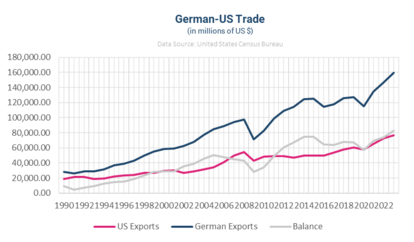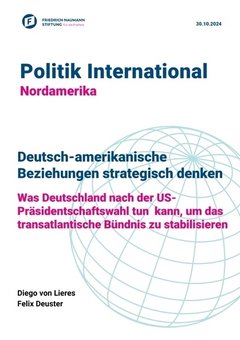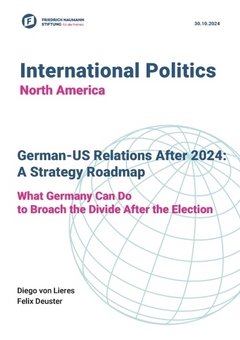US Election
A Strategy Roadmap for German-US Relations After 2024

Ships from Standing NATO Maritime Group 2 sail in the Mediterranean Sea
© Crayton Agnew / U.S. NavyOverview: Transatlantic Background & Future Prospects
The United States today is Germany’s largest trading partner, guarantor of European security, and a significant diplomatic ally. Against this backdrop, the Trump administration’s approach to transatlantic relations came as a shock to many on the German side. But Donald Trump’s criticisms of the transatlantic partnership were not a unique product of idiosyncratic personal views; they represented an extension of an increasingly significant line of thought in American politics, now not uncommon among Republicans nor Democrats.
Whatever the outcome of the 2024 US Presidential election, Germany will be confronted with serious conversations across the Atlantic. Berlin’s negotiating position is comparatively disadvantageous: it simply has much more to lose than the United States. Given this context — regardless of whether Germans feel this is fair or not — it is only responsible for the country’s leadership to begin thinking carefully about how to prevent further alienation and, ideally, re-kindle warm relations.
Germany will have to counteract the general rise of isolationism in the US by proving itself as a capable, sovereign equal in the relationship, both in terms of commitment and in terms of capabilities. To brace against current challenges, it will have to re-tool aspects of its military, trade, and energy strategies, which will in turn help make it a credible partner for an American state wary of free-riders and strengthen its negotiating position.
Why Germany Should Care: Implications of Transatlantic Estrangement
If the US reneges on its past commitment to direct protection of Europe, the continent will very rapidly be faced with security demands it is simply not prepared to meet in the short to medium term, neither politically nor militarily. Were the US to discontinue its support of the Ukrainian war effort, Europeans could be forced to shoulder the cost of war aid unilaterally; Europe also remains dependent on international supply chains traditionally backed by US-enforced freedom of navigation; and an overall withdrawal of American security guarantees would exacerbate the geographic vulnerabilities inherent to NATO’s European bloc and make nuclear proliferation on the continent more likely.
On trade, too, Germany is more exposed to risk than the United States. If the United States decides to move further towards isolationism on the economic front, Germany faces both huge shortfalls in existing trade and the loss of a partnership whose access to resources — from energy and rare earths to financial capital and an innovative tech sector — could shore up the Bundesrepublik’s resilience. This is especially critical in light of coming challenges, such as a structural deindustrialization brought about, in part, by decisions on energy policy, a lagging position on tech innovation, and an ageing tax base which forebodes both declining economic growth and swelling social expenditures.

German-US Trade, 1990-2023
© Friedrich Naumann Foundation, 2024Bearing in mind these extraordinary stakes, Germany must take steps to ensure that disengagement remains unattractive and that its American partners regain confidence in continued cooperation. This will require a strategic approach based on the premise that the best way to protect US national interests is for the West to act in concert. Merely emphasizing purported common values will no longer be enough.
The Work Done So Far: Successes & Shortcomings
European states are coming to the realization — some more slowly than others — that they must learn to stand on their own feet going forward.
- On both the German and European fronts, the past year and a half have seen a remarkable consolidation of the NATO consensus. Over two thirds of members now meet the 2% spending target. A solidification of support in public opinion has been accompanied by the geographic buildout of the alliance to include Sweden and Finland. The alliance’s eastern flank has been further fortified by additional troop deployments. After years of severe technical shortcomings, the German government’s 2022 special defense fund has allowed for significant investments in cooperative defense projects, the procurement of updated hardware, and the expedited provision of military aid to Ukraine.
- On matters of trade, it seems to have finally dawned on Berlin that excessive reliance on China, may not be in the country’s best long-term interest. The government’s China strategy from July 2023 frames China as a competitor and systemic rival, calls for heightened scrutiny of Chinese investments in the Bundesrepublik and suggests incentives for German companies to divest from the PRC. And Germany has also shown greater willingness to be assertive towards Beijing more generally, including by sailing two warships through the Taiwan Strait.
- On the energy front, Germany has since the invasion begun drastically to draw down its dependence on Russian coal, oil, and gas. It has taken steps to strengthen the transatlantic energy partnership with the United States, including through the construction of new liquefied natural gas terminals and increased imports. It also ramped up usage of domestic coal to make up for shortfalls in 2022 and moved to temporarily extend the lifespans of nuclear power plants until 2023. Lastly, it has continued to invest in renewable alternatives as part of its broader agenda.
While representing a step in the right direction, the measures taken under the Zeitenwende rubric so far leave room for improvement.
- Despite progress in its security policy, Berlin still lacks the necessary decisiveness to fulfil the promises of the Zeitenwende. Although the country has nominally spent over nearly $16 billion on aid to Ukraine, Germany’s proportional expenditure places it 15th among the Western allies. The coalition government’s new budget halves support for Ukraine for the next fiscal year and provides a mere fifth of the budget increase requested by Defense Minister Pistorius. Perhaps most importantly, Berlin has yet to develop a sustainable funding strategy for its renewed defense commitments: its special defense endowment will be entirely spent by 2027–2028.
- On trade, Germany’s typical risk-aversion may be hampering, in the short term, the moves necessary to reduce exposure in the long term. After all, China remains Germany’s second-largest trading partner and largest market for vehicles and chemical manufacturing, and reporting indicates that Berlin’s China Strategy was “toned down” compared to a previously leaked draft. And Germany was one of the few holdouts at odds with the European Commission’s proposed tariff on Chinese EV imports.
- On energy, Germany remains without a truly practicable autonomous energy solution in the short to mid-term, given its rejection of nuclear energy and the long time horizon required for one-hundred percent renewable alternatives. At the same time, though having nominally decoupled from Russian inputs, the Bundesrepublik is still injecting money into the Russian economy through the purchase of laundered Russian energy via third party markets.
The Road Ahead: Mending the Rift & Thinking Proactively
1. Security
Germany must improve military capacities and readiness — in other words, it must actually do what the Zeitenwende promised. In its endeavor to do so, it must be ambitious in its reform of the military, foresightful on matters of industrial policy and strategic technologies, and shrewd in its approach to funding.
- For one, Germany will have to be ready to make long-term investments into modernizing its military and maintaining its funding commitments under NATO. For another, it should be smart about reducing waste and inefficiency, both out of fiscal prudence and to maintain its democratic mandate.
- To pay for the necessary transformation of its security apparatus, the federal government must design a funding structure that allows it to do so — without removing or sidestepping the constitutional debt brake or taking existing social expenditures for granted or disconnected from security needs.
- As part of its effort to reduce waste, mismanagement, and inefficiency, Berlin should empower a central decision-making body for the Defense Ministry in lieu of the three currently competing centers of power. This would help restore pragmatic, proactive leadership capabilities both to efficiently deal with procurement in times of peace and to rapidly respond to crises. Along the same lines, one should streamline or do away with the Bundeswehr’s three agencies dealing with personnel, procurement, and infrastructure.
- The government should support efforts to make the army mobilization-ready on short notice. To test real-world readiness, interoperability, and command and control structures, Germany should ramp up its participation in joint training exercises with NATO partners, along with select mission deployments in support of NATO’s goals, such as anti-piracy operations around the Horn of Africa.
- Germany’s national security strategy needs to incorporate an awareness of strategic resources and productive capacities. To this end, Berlin should continue to devise long-term strategies to shore up its industrial capacity in addition to re-thinking and, where needed, restructuring critical supply chains, ensuring that the country is never left out in the cold should conflict break out.
- Finally, German civil society should make efforts to construct a new paradigm of assertive, but responsible military leadership and service. Only thus can the Bundeswehr overcome its recruiting shortfalls and strengthen its readiness.
2. Trade
On trade, too, Germany ought to re-think some of its existing practices if it wants to maintain or improve its transatlantic relationship.
- Reliance on autocratic regimes is ethically questionable, strategically risky, and sends the wrong signal to the United States. It exposes the German economy to geopolitical tensions, jeopardizes sensitive military and industrial secrets, and could force Germany’s hand to either abandon its international alliances or face economic calamity in case of a conflict.
- In the next iteration of its China Strategy, Berlin needs to make clear its change of direction and avoid watering down sound policy out of short-sighted political or business concerns. Germany needs to start acting proactively, not reactively.
- To hedge against potential disruptions, Germany should diversify its partnerships to the extent it can do so. Conversely, this sort of proactive contingency planning might well stabilize the German-US relationship by placing Berlin in a better negotiating position vis-à-vis Washington.
- Germany should seriously consider betting on the construction, in the long term, of a northeast-to-southwest Atlantic economic network, since Latin America still represents not even three per cent of Germany’s exports, despite boasting a population of 656 million and a combined GDP of over $7 trillion.
- It might make sense to pursue partnerships with selected Gulf States in sectors like cutting-edge tech, aerospace, and finance — particularly among states currently moving towards political liberalization and economic diversification.
- Finally, Germany should strengthen its trade relations with the highly developed states in the Asia-Pacific region. Japan is already Germany’s second-largest trading partner in Asia, and Germany is South Korea’s largest trading partner in Europe. Australia and New Zealand also possess robust agricultural sectors and plentiful strategically important resources.
3. Energy
On energy, too, Germany needs to be confident, self-reliant, and pragmatic in order to be perceived as a trustworthy, mature partner by the US.
- While nominally no longer dependent on Russian energy, Germany, like much of the rest of Europe, remains a major consumer of “laundered” Russian energy exports, whether through Azerbaijan, Turkey, or India. If the continent’s — and Germany’s — shift in policy is to be credible, it cannot be circumvented by backdoor channels.
- Germany should seek energy sources that are secure, strategically sensible, and ideally renewable. But the government must be pragmatic: until such point as all of the country’s energy needs can be met by renewables, pragmatic stopgap solutions will have to be put in place.
- In the medium term, nuclear energy should be one of the prongs of Germany’s energy strategy. Germany should explore the possibility of getting its mothballed nuclear plants back online but it should also exploit its status as a high-tech, precision-engineering hub to pioneer the development of new nuclear technologies. In this spirit, it should encourage independent innovation through the removal of bureaucratic hurdles and the creation of tax-free innovation “sandboxes” to attract private R&D.
- In the meantime, as long as Germany remains reliant on fossil fuels in the short term, it should at least a) make the move away from dirtier fuels such as coal towards natural gas, and b) ensure that its energy expenditures also buy it political capital, e.g. by ramping up its usage of American gas as a strategic incentive for its transatlantic partners
- Hedging its bets, Berlin should seek out additional partners to pick up whatever slack is left after it fully decouples from Russian energy. Canada in particular might prove a productive transatlantic partner: the country possesses vast energy reserves that are currently underutilized because of lacking refining capacity and infrastructure.
4. Rapprochement
If Germany is to bring the United States back to the table, it needs to undertake a genuine exercise in political self-awareness and critically confront its past missteps.
- Berlin’s foreign policy circles will have to move beyond blaming American provincialism for the currently widening fissures between both sides of the Atlantic. Europe can no longer treat half of the American public and the American political establishment as untouchable because of their political leanings. As it was with Brexit, it remains unproductive to brand entire demographic sectors as xenophobic bumpkins because of their skepticism of international integration.
- Germany and Europe will have to shed their free-rider image. Many Americans feels that Europe selfishly failed to heed warnings about dependency on strategically dangerous bedfellows, including Russia and China, on matters of trade and energy, and that the US is now sharing in the cost of those errors. This perception is unsustainable for the transatlantic relationship.
- Those shaping Germany’s foreign policy should make sure to be proactive in building relationships with their counterparts in Washington on both sides of the aisle, fostering contact with Republican and Democratic lawmakers and foreign policy advisors of all factions early on while eschewing the temptation to be guided by ideological affinity.


